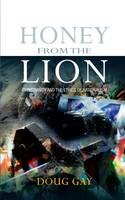
BOOK REVIEW:
Honey from the Lion: Christianity and the Ethics of Nationalism
by Doug Gay. SCM Press, 2013. 192 pp.
Later this year, citizens of Scotland will vote in a referendum whether to continue their country's 300-year-old union with England or to go it alone. For author Doug Gay, the possibility of Scottish independence provides an occasion for reflecting on the larger issues surrounding nationalism. Is nationalism a good thing? Or is it, as many Christians have historically believed, an idolatrous overestimation of one's nation at the expense of other image-bearers of God elsewhere? Gay's project here is to defend nationalism based on his Reformed tradition of Christianity, an admittedly tall order, given nationalism's dark history.
The title comes from the Samson cycle of stories in the biblical book of Judges, in which the flawed Israelite hero scoops honey from the carcass of a lion he has earlier killed (Judges 14:5-9), and from the Tate & Lyle syrup cans familiar to Scottish households from the late nineteenth century. "The relationship between lions and honey I read (freely) as a metaphor for the central question of political theology and political ethics—the relationship between power and virtue." Although nationalism has indeed led to grave injustices and oppressive polities, it need not do so. Accordingly, Gay undertakes to defend a modest and "sweet" vision of nationalism that is more compatible with the Christian faith than, say, the version in Quebec, which aims to snuff faith from the public square.
Gay defines nationalism as "the making of combined claims, on behalf of a population, to identity, to jurisdiction and to territory." His use of the word claim is significant in that it points to the need to weigh and assess something, particularly against contrary claims in a public forum. What I read him to say here is that there is nothing automatically right and salutary in Scottish independence. Whether or not Scotland should be a sovereign nation-state is ultimately a prudential judgement about whether justice for its people would be better served in a United Kingdom or in a separate country. After weighing the relevant factors, he believes a separate Scotland is a defensible goal for the serious Christian.
Read the entire review here.

No comments:
Post a Comment